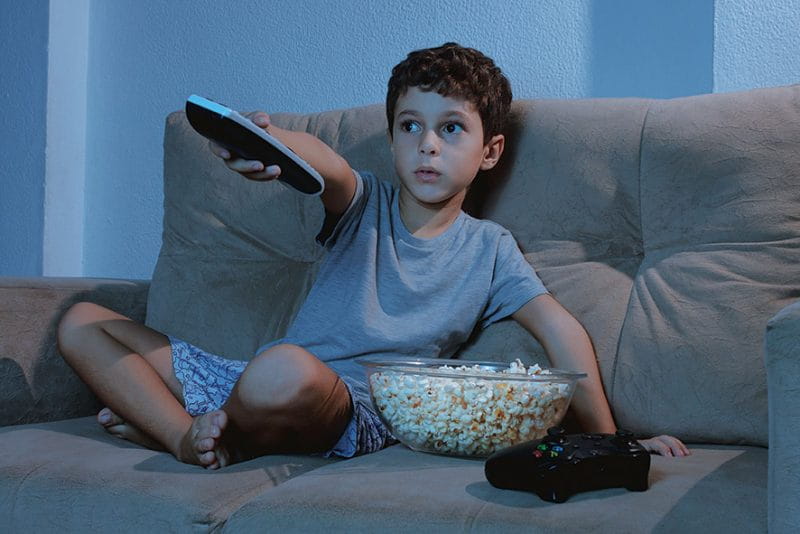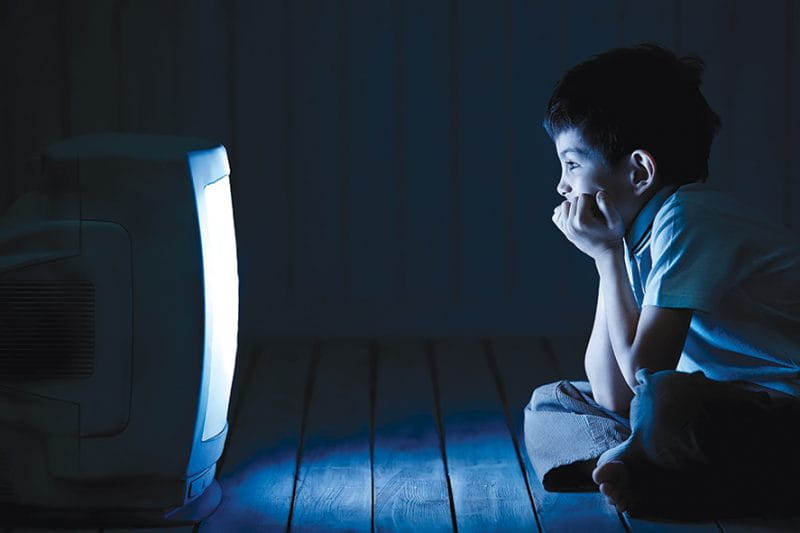Be a little cautious, apply the following tricks, and keep your child away from the television. It may seem a little difficult to begin with, but what matters at the end is the wellbeing of your child. Parama Sen tells you just how.

There is no doubt that TV screens are a terrific babysitter! But if you have a new-born baby at home and routinely use the TV to calm him/her down, so you can get stuff done, you’re actually shaping your child’s brain so that he/she will be less able to entertain him/herself all alone, over time. If your kid is already a toddler, then you have to be extra cautious, because he/she is capable of narrating their ‘own’ opinion now!
Go through the following ways to ensure your child is not getting an overdose of Doremon, Chhota Bheem or any of the other sitcoms your child might develop an addiction for.

- Have your kids watch TV programmes, not just TV.
This means planning ahead with your child what he/she wants to watch and turning off the TV when the programme is over. The idea is that you’re making a conscious decision to watch something instead of simply flipping around the channels to find something on. Television should be an engaging activity, not simply a mind-numbing time to chill out. - Don’t put a TV inthe hall/drawing room.
Too much of the time, television becomes a backdrop to family life—it blares away while the kids are playing, mom is cooking, or the family is eating. Remove it from there and rather hang it in your bedroom and lock the door. So, every time your child wants to watch TV, she/he has to seek permission. - Avoid setting a daily TV limit for your child.
This seems counterintuitive, but it’s surprisingly effective. This will avoid tacitly sending the message that there’s a certain amount he ‘should’ be watching. But just keep in mind, most experts believe that, more than two hours a day is too much for children aged two and older. So, whatever the situation is, this ‘hour limit’ should be maintained. - Be firm but open-minded.
Shows with graphic sexual content or violence should obviously be off limit for children. But what about the greyer areas—programmes you think are simply inane or unpleasant? Let your child come to you and explain why he/she wants to watch it, then work out a reasonable compromise. - Prohibit TV and videos during playdates.
Kids need time to play and interact with their peers—television only acts as an impediment. Make a firm rule in your house, and let other parents know that you would like them to respect your ‘no TV on playdates’ rule when your child is visiting their home, too. You have to keep a tab whenever your kid’s friends are visiting and if they are playing in the room, where there is a TV, just keep the remote somewhere else. - Watch TV with your kids whenever possible.
Knowing what your child is watching is the key. In this way, you will also not end up being surprised by a show that may seem kid-friendly but isn’t. Try to find out what excites them to watch that particular show, explain if they don’t understand a twist and enjoy. - Record shows ahead of time if possible.
It not only saves you viewing time, but also lets you zip through commercials for junk food, violent movies, and toys. Some experts say, this is one reason TV watching is linked to childhood obesity. You can also pause a show to talk about what you’re watching. If you can’t record shows, hit the mute button during the commercials. - Establish a TV-free family day.
Take one day of the week and switch the TV off for the entire day. Spend a little more time with your kids on that particular day. Involve them in household activities, go for a walk, play games or whatever that you do occasionally. This will not only help the kids but also you to get connected with them on a different level. - Be a role model.
Certainly, peer pressure has an influence on the kids TV watching habit. But ultimately, as with everything else—violence, eating habits, racial attitudes—children are most affected by the example that parents set. If they see you mindlessly flipping channels, if you ‘shh’ them while you watch your favourite sitcom, that’s the attitude they’ll eventually adopt. But if you concentrate on reading a book, drawing something, listening to music…they will eventually be glued to that.

Why is this a problem
• TV changes brain development. It can sabotage kids as they learn to read, and keep them from becoming good students.
• Toddlers and pre-schoolers have other very important developmental work to do. The huge amount of time spent on TV should be spent on things that are better for their brains—blocks, art, running around, engaging with other people. These activities teach kids self-regulation, and are the foundation for the next stages of learning.
• TV is addictive and this sets up a habit for life. Every child growing up today will have enough trouble with screen addiction without us setting their brain up to make it
more likely.
Raise a Media-Savvy Kid
It’s unlikely you’ll get your child to stop watching TV completely, but you can help him/her become an ‘informed’ viewer. One way to do that is to teach him/her to be critical of the many advertisements he’ll see.
Try these following tricks:
• Play ‘spot the commercials.’ Ask your child to tell you the difference between a television programme and an advertisement. Discuss what the marketers do to make products seem attractive.
• Give him/her a reality check. When you watch a show together, talk about whether the events could happen in the real world. If not, ask him to explain why not.
• Practice ‘talk back.’ Encourage your child to speak directly to the TV when he sees something he disagrees with in a programme or spots a false commercial claim.
• After every week, ask your kid to write a piece on what they have learnt from TV that week and what needs to be changed. You can publish that on your social media page and later on show them the ‘likes’ or the comments that the post has got.


